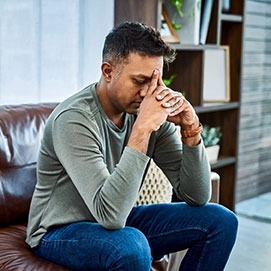

Symptoms of Seasonal Depression
Depression is distinctly different from everyday feelings of sadness or fatigue that can be brought on by life’s ups and downs. Seasonal depression is marked by some specific symptoms including:
- Sleeping more than usual and feeling drowsy during the day
- Loss of interest in activities that once brought you joy
- Feeling irritable and anxious
- Feeling guilty and hopeless
- Decreased libido
- Trouble focusing or concentrating
- Increased appetite and cravings for carbohydrates
- Physical symptoms, such as headaches
- Thoughts of suicide or death
“Although the cause of SAD is not completely understood, it is thought that decreased sunlight in the fall and winter can disrupt your body’s circadian rhythm, causing feelings of depression,” says Ram Mahato, M.D., medical director of the Center for Behavioral Health at JFK University Medical Center Center. “This change in sunlight and season can also affect your body’s levels of serotonin and melatonin, two hormones that affect your mood.”
Combating Seasonal Depression
Although you can’t stop the changing of the seasons, there are a few things you can do to combat seasonal depression.
- Stay Active: Exercise is a great way to naturally combat the imbalance of brain neurotransmitters (serotonin, norepinephrine and dopamine) that can contribute to depression. “When we exercise, our bodies produce endorphins, which are mood-boosting hormones that counteract serotonin and dopamine deficiencies that can bring us down,” says Adriana Phan, M.D., psychiatrist located in Hackensack, New Jersey. Pick an activity you enjoy; it doesn’t have to be a chore. Gardening, walking, dancing and even playing with your kids are all good forms of exercise.
- Eat Healthily: Our diets do more than provide us energy; they also impact our mental health. A healthy diet rich in vegetables and fruits and low in highly processed foods can help curb feelings of depression by reducing inflammation in our bodies, which is a risk factor for depression.
- Stay Connected: Social connections can be a great defense against depression. Whether you talk on the phone, video chat or meet in person, keep in regular contact with friends and family for a healthy and happy mind. “Experiencing depression of any kind is not a sign of weakness and shouldn’t be dealt with alone,” says Kristen Clark, M.D., medical director of Outpatient Adult Behavioral Health Services at Jersey Shore University Medical Center. “If you are experiencing symptoms of depression, ask your doctor what treatment options are available.”
- Get Outside: Even on a cloudy day, go outside for a walk or to eat lunch at a park. Get as much sunlight as you can: Sit or work close to a window, open your blinds or trim trees blocking sunlight.
Next Steps & Resources:
- Meet our source: Ram Mahato, M.D., Adriana Phan, M.D. and Kristen Clark, M.D.
- To make an appointment with a doctor near you, call 800-822-8905 or visit our website.
Find a doctor near me

Does Blue-Light Therapy Work for Varicose Veins?

5 Things You Should Never Say to Someone With Depression or Anxiety

5 Simple Ways to Help Limit Your Child’s Screen Time
